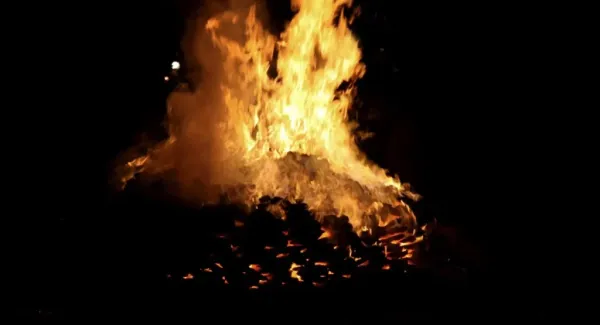
Womencremation The theoretical basis of prohibition is found in most of the Puranas. According to Pt. Ramakant Dwivedi, a scholar who explained the Garuda Purana and Garun Samhita, “The crematorium is always considered the center of tamoguni energy; it was a ’emotional security shield’ to keep women with delicate emotions away from it.” Here Womencremation It was seen as religious dignity, not as gender discrimination.
According to the theory “ghost communication” described in memory texts, the ‘free’ souls living in the pyre-dhoom and bonely atmosphere first affect the weak or emotional mind. Traditional society believed that women are naturally more sensitive; so Womencremation The ban was made mandatory to protect them.
The tradition of shaving the hair of men involved in the cremation Womencremation One of the reasons for the version is. Jyotirvid Dr. Meera Tiwari explains, “Long hair of women is a symbol of their ‘beauty and social honors’. Mundwana would hurt the Indian aesthetics, hence Womencremation Prohibition became natural. “
Contemporary psychologist Dr. Arvind Gupta argues that Womencremation The custom is actually a method of ‘collective mourning management’. Research has made it clear that more crying or compassion increases tension in the bereaved family. The male-oriented society kept women away from the crematorium to control it-that is Womencremation A kind of emotional filter became.
The rule of the ancient scriptures was to return from the crematorium and wear new clothes and take a bath with an individual water. The women of the family used to perform this ‘purification process’ by staying at home. As a result Womencremation Prohibition gave the role of the house the status of ‘Sanskar-Peacek’. However, Epidemiologist Dr. Shruti Sharma says, “Today medical science has proved that the risk of infection is the same for everyone; not only a scientist to save women.” From this Womencremation Questions arise on the ban.
According to Pandit Ramakant, the soul is a “product of religious legend”; But Parapsicology Researcher Dr. Ajay Mishra Womencremation Comprehensive survey on custom. Conclusion: “There is no solid scientific basis that the phantom ‘attack’ only ‘attack’ on women.” Despite this Womencremation Vishwas took deep roots in folk culture.
Article 14 of the Indian Constitution gives the right to equality. Women can participate in all funeral actions; i.e Womencremation Prohibition is not just a legal obligation, but only traditional ‘social cod’. In the year 2020, the Supreme Court said in the hearing of the ‘Muslim Women’s Cemetery’ case – “Funeral rituals cannot be differentiated on a sexual basis.” Although this decision was to the cemetery, many law experts Womencremation Also considered an example in the context.
A 2023 Lok Adalat in Chandauli, Uttar Pradesh Womencremation While resolving the family dispute, the daughter was given the right to offer fire for the first time. The report of NGO ‘Nirbhaya Dialogue’ states that after 2010, 117 such cases came up where daughters Womencremation Broke the tradition. This number is still negligible – but the message is strong.
In April 2025, 26 -year -old journalist Nishtha Mishra from Agra offered fire to her father. On social media Womencremation The hashtag trend occurred. Nishtha wrote, “If daughters can perform every father’s work throughout their life, then Womencremation There should be no law to stop them. ” Post received 4 lakh likes; Womencremation The turning point of the discourse became.
The #Womencecremation top ‑10 trend was in trend on forums like Twitter, Instagram and Facebook. According to the data analytics agency ‘Talkwalk’, between March 2025 Womencremation But 1.5 million posts came; 62% of users supported the removal of the ban.
Pt. Shiv Shakti Tripathi, the chief teacher of Kashi Vishwanath, says, “Religion is eternal, but its interpretation is flexible. If community consent is made Womencremation The practice can be changed. ” That is, the classical doors are not closed.
Swami Achuthanand Saraswati writes, “In Rigveda 10.18.8 ‘Uru space—In here Womencremation Not prohibited. ” This interpretation of Vedanta is considered progressive.
Delhi Womencremation Awareness camps are being run in 14 cities regarding rights. Co-founder Pooja Chandni claims-“We persuaded 48 families to give daughters equal rights in cremation.” Womencremation This ground change in the case is commendable.
However, in parts of Bihar and Madhya Pradesh Womencremation Opponents threatened social boycott of women when they go to the crematorium. Sociologist Dr. Revathi Nair believes, “If traditions break, resistance is natural; Womencremation The speed of the campaign cannot be stopped anymore. “
E-Sradhanjali Startups 24 × 7 are selling funeral packages in metro cities. Marketing head of these companies Amit Bankhede says, “Daughters ask in 45% calls – what Womencremation Is it possible? ” This shows that the demand is increasing rapidly.
Life Insurance Corporation (LIC) took out a ‘parallel’ policy in 2024, in which Womencremation On joining, loved ones get 5% additional bonus – Splash: Sexual equality incentive.
Tradition, spirit, security and equality –Womencremation The dispute has been swinging between these four poles. Today, legal clarity and social awareness have given the voice of both father -in -law ‘duty’ to the daughters. Still in rural India Womencremation Emotional and religious obstacles against them are maintained.
The wheel of change is gradually correct, but it is certain to roam. For example, the scope of education will increase and new chapters of women’s education will be written, Womencremation Prohibition will also become a part of history books – just as Sati, child marriage and devadasi system became.